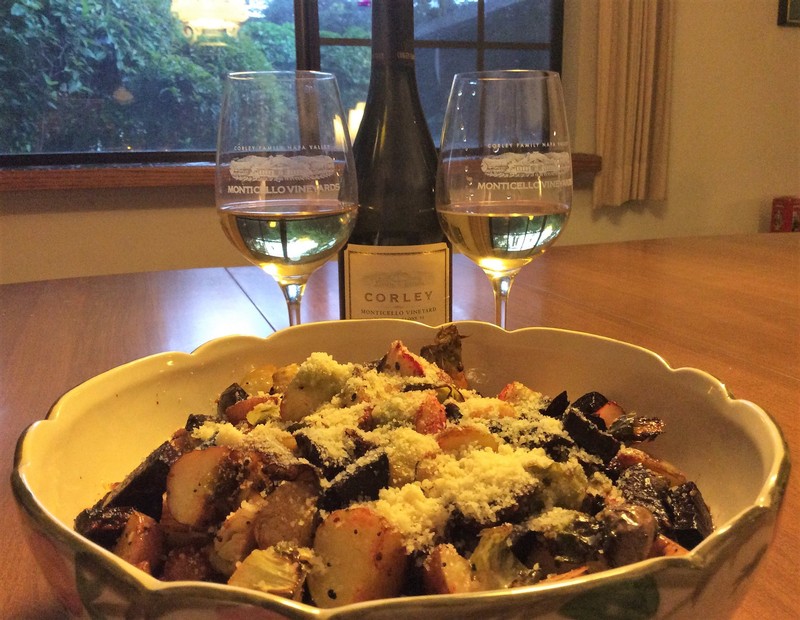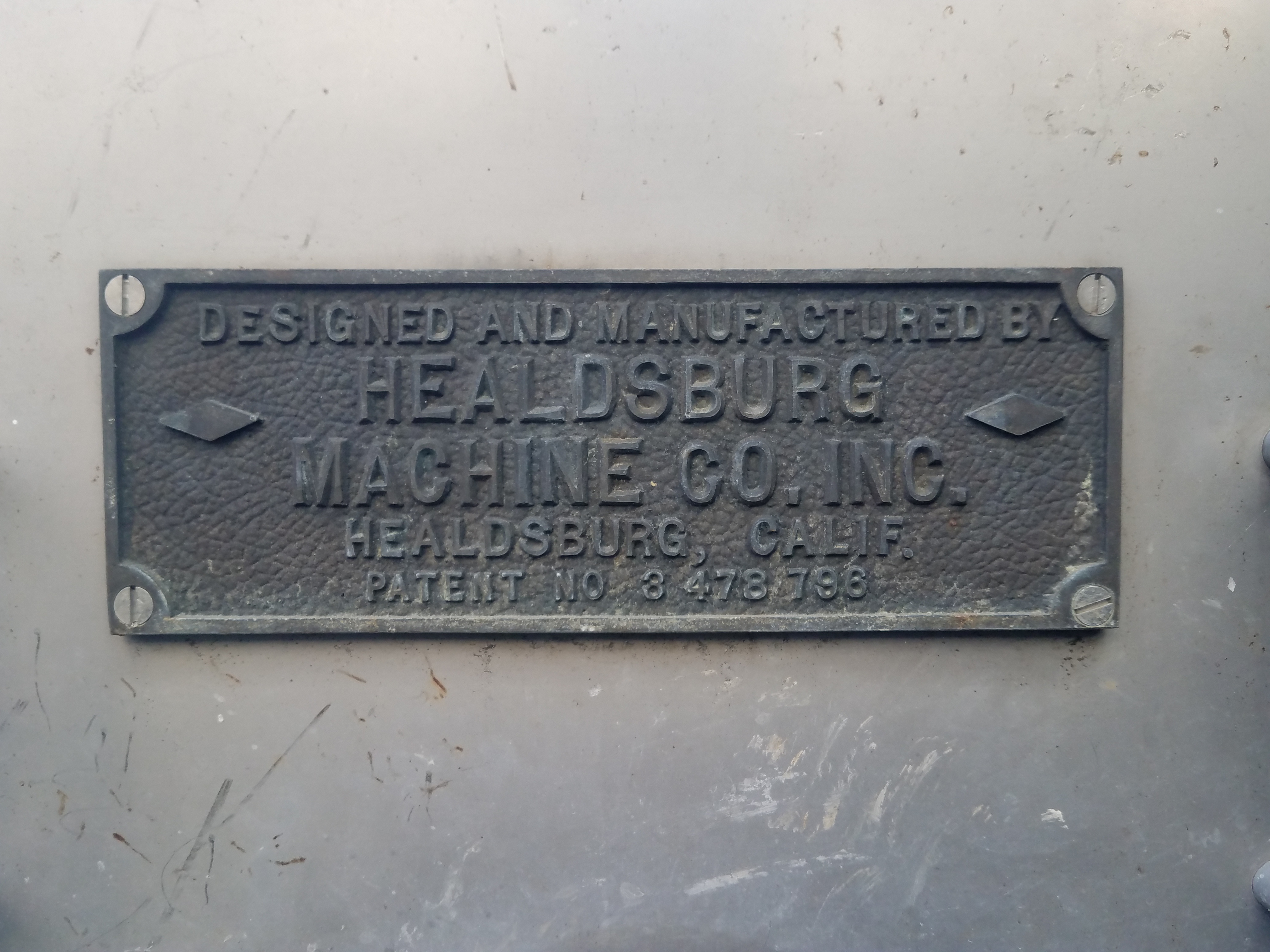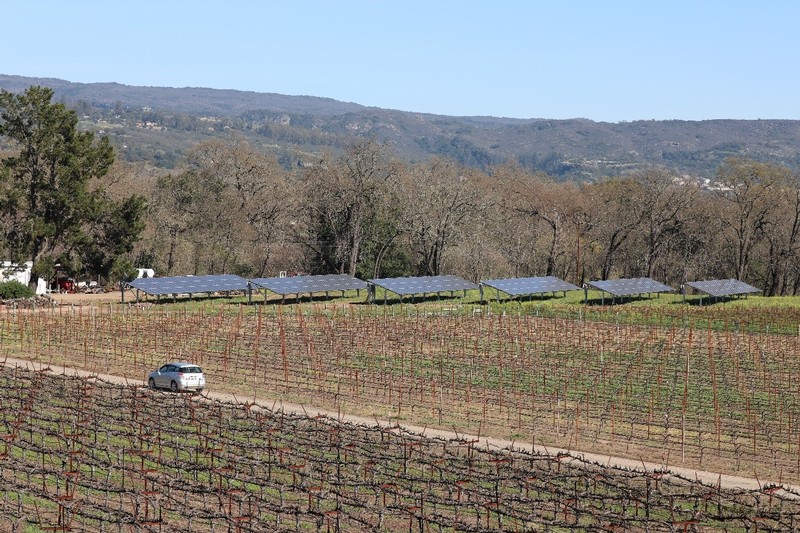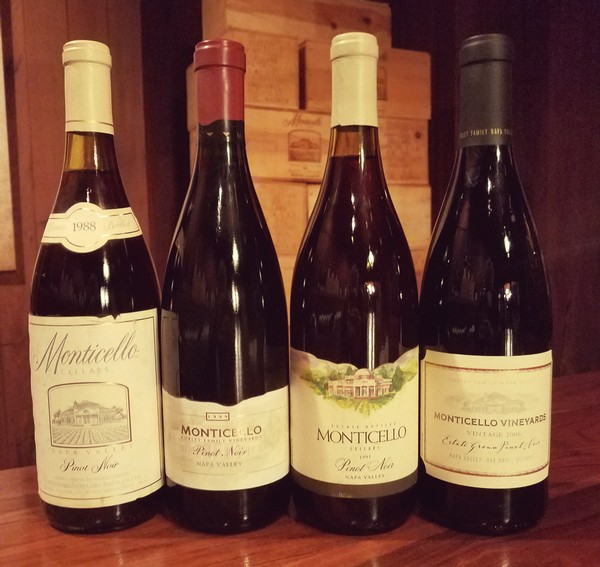Traveling with Beets & CORLEY Chardonnay
As we all spend more time at home, we are having fun experimenting with food and wine pairings. The famous British wine writer Hugh Johnson once said that "wine carries geography with it, so wine drinking can be a great way to travel, especially when one has to stay home".

By: Pawel Cetlinski, Wine Educator at Monticello Vineyards for 2+ years
Beets and wine? Sounds odd or even contradictory. In the USA, we have come to see beets featured more and more in restaurants, often served with salads or cheese. Now is an opportune time to serve them with wine! This food and wine pairing I hope provides inspiration to put the wholesome veggie back on your plate. It’s a scrumptious mesalliance!
Where I come from, which is Poland, beets are one of the staples of our cuisine - like in many Eastern European countries. Any Polish grandma would roll her eyes when seeing beets sold in organic aisles as some kind of superfood. While Poland is definitely not a wine country, there are some German-influenced wineries of the southwest. I have experimented with paring Polish white wines and foods, including beets in the past. Nothing compares to the CORLEY Chardonnay and this beet recipe.
My wife, a native of California who lived in Poland for 10 years and also a long time friend of the Corley family, invented this simple recipe that combines a mix of European veggies, and it is a perfect match for the gorgeous 2018 CORLEY Chardonnay from the tiny Block III behind Monticello’s Jefferson house. (Come visit us and I’ll be happy to show you the actual block!) The acidity of food and wine pairing is the key. Beets provide sweet and acidic flavors which, combined with salt, are a perfect match for a balanced fruity wine. The meticulously measured “butteriness” of Corley Chardonnay works like honey in the dish!
Wine Beets or "Scrumptious Mesalliance" Recipe
Get ready for a journey of flavors throughout Europe. We begin our food travels in rural Poland with sweetness and a hint of sourness - grab some beets. Next, we fly to the capital of Belgium and add brussels sprouts, (Yes, the name comes from the fact that they were cultivated in Brussels.) The burssels sprouts add a touch of bitterness - just like hops in Belgian beer - as well as the crunchiness of Belgian fries. Fly to Ireland to add the potatoes, the core of the dish. However, potatoes were brought to Poland by an Italian Queen Bona Sforza, so for the final touch we have to sprinkle a healthy amount of grated Parmesan cheese on top. From the shores of Europe, we fly to California’s Monticello Vineyards (that's a long flight) for the wine pairing. Our superb fruity Chardonnay boasts flavors of apple, pear, citrus, and a touch of vanilla. It’s like adding butter to finish your dish.
Ingredients
- Bottle of 2018 CORLEY Chardonnay, Block III | Clone 95 (for wine pairing)
- 3 medium sized beets
- 1.5 lb of small potatoes (ideally Potato Mini Medley)
- 1 lb of brussels sprouts
- Trader Joe’s “Everything but the Bagel Sesame Seasoning Blend”
- Olive oil
- Grated parmesan cheese
- Spices: Pepper, salt
- Bacon bits (optional but suggested)
Directions
Preheat the oven to 385 degrees F.
- Wash all of your veggies throughly.
- Slice off the bottom ends of the brussels sprouts and chop them into quarters.
- Peel and dice the beets. (The smaller size helps them cook thoroughly.)
- Wash and dice the potatoes. (No need to peel.)
- Spread veggies onto a large baking sheet (suggested 12’’ x 18’’).
- Drizzle olive oil over the veggies. Mix carefully on the baking sheet. Be sure olive oil covers all the veggies.
- Season generously…
- Bake for 40 min.
- Before serving, sprinkle with Parmesan Cheese and bacon bits (optional)
Enjoy! Na zdrowie!
One of Thomas Jefferson’s great friends was a Polish general Thadeus Kościuszko, whom Jefferson called “The Purest Son of Liberty”. I wonder if Kościuszko and Jefferson had beets and wine together…
Earth Week : Wine Down With A Glass from Our Organically Certified Vineyards
Earth Week : Old Green & New Green
As we celebrate Earth Day this week, we’ve had a lot of good reminders and food for thought about what it means to be sustainable. All across the world, everyone has made some kind of adjustment to their lives. Many have been sheltered in place and have not been out at all, others have been continuing to do their work, if deemed ‘essential’. These last few months have been a globally experienced event, even if our individual experiences have differed. In terms of the impact on the planet as a result of the decreased activity, there have been some positive stories that have emerged. We’ve heard of air and smog clearing in typically polluted areas. With supplies not as readily available, and our access to stores reduced, we’ve all been reminded to think through how we can make things last, and how each of us can get by with less.
Our family has been growing grapes in Napa Valley for 50 years over three generations, an accomplishment we’re collectively very proud of. Our dad and founder, Jay Corley, had an old-school mentality which still pervades our thinking.
Procure quality equipment, take good care of it, and make things last. I think of this as ‘Old Green’. This way of thinking has been applied to our business since day one. We built the winery with good quality equipment, the best that was available in 1981. Good quality stainless steel tanks with thick steel stands. Permanent barrel storage racks that withstand anything that comes at them, including the 2014 Napa Earthquake. Quality John Deere tractors that still work our fields. A Healdsburg Machine Company crusher/destemmer that still works as well today as it did in 1981 when it was bolted into our crush pit. Rather than install an overhead hoist, we bought a 1950 Hyster forklift to dump the old 2 ton valley bins. It was 31 years old when our dad bought it. Now it’s 70 years old. It still runs, and we still use it. These are all examples of ‘Old Green’. Procure quality equipment, maintain it, and make it last.

That said, we also subscribe to ‘New Green’. We converted the Monticello Estate over to solar power in 2017, and currently generate >90% of our own electricity from the sun. We’ve replaced all of the sodium-vapor lights in the cellar with low energy fluorescence. We’ve insulated all of our tanks, and put air curtains on all of the warehouse doors to conserve the refrigeration inside the cellar. We replaced our original refrigeration system with a new efficient, four-compressor system that cycles on depending on the refrigeration demand. As the refrigeration demand increases, additional compressors will cycle on. As the demand decreases, the compressors will cycle off to save energy.
In the vineyards, we’re very thoughtful with the products we use and spray. Two of our vineyards are certified organic, and one of those is certified with Napa Green. We continue to work towards organic certification on our other properties.
Like all, our motivations are complex. We care about the environment, and want to be good stewards of the land we own and tend to. We care about our business, and want to make our equipment and investments last and thrive. We care about our family and extended family (staff), and want their work environment to be safe. We care about future generations, including our own future generations that will hopefully be looking back on the decisions we’re making now.
In almost every aspect of our business and in our family philosophy, we have one foot firmly planted in tradition, and another foot stepping forward seeking progress. Our approach to sustainability is much the same … Old Green, New Green.
Earth Day and Monticello : Celebrating 50 Years!
Monticello Vineyards, a family-owned and family-operated winery in the Oak Knoll District of the Napa Valley, is excited to announce that Earth Day and Monticello Vineyards share the milestone of turning fifty years old in 2020.
On April 22, 1970, 20 million Americans — 10% of the U.S. population at the time — took to the streets, college campuses and hundreds of cities to protest environmental ignorance and demand a new way forward for our planet. The first Earth Day is credited with launching the modern environmental movement, and is now recognized as the planet’s largest civic event.
On April 22, 1970, a 38-year-old Jay Corley surveyed a 120 acre prune orchard along the Napa River in southern Napa Valley and envisioned planting a vineyard with Chardonnay and Pinot Noir. Within three months the purchase was made and it would forever change the Corley Family.
Little did the first participants of Earth Day know that their first protest would became a global phenomenon. Likewise, even though it would become known as the Golden Age of the modern wine pioneers in Northern California, it wasn’t yet clear in that moment. In fact, from the vantage point of Jay Corley’s wide circle of business associates, the endeavor looked downright peculiar.
The family-owned and family-operated California wineries that started in the 1960s and 1970s, and introduced New World wines to the world, are harder to find now. Those that do remain share a devoted respect for the land and for sustainable practices. We see it in the vineyards and we see it reflected in the wines.
“As a multi-generational winegrowing family in Napa Valley we are very mindful of our environment and community,” remarked Kevin Corley, President and Winegrower. Our State Lane Vineyard and Knollwood Vineyard, where we grow Cabernet Sauvignon, Merlot and Syrah, are certified organic and NAPA GREEN certified.
The most visually obvious representation of sustainability are the solar panels placed in and around many vineyard estates and winery operations of the Napa Valley. “We use a comprehensive range of practices from organic farming to the installation of solar panels to steward the land for future generations, protect the environment and wildlife, while maintaining the highest quality grape growing and winemaking. The Corley's are also committed to our community and have been active over these past 50 years in volunteering and leading many needed local nonprofit organizations.”
Monticello planted its solar array with 550 Sun Power High Efficiency silver-framed premium modules. These modules, or solar panels, are affixed to six solar arrays whose power generation is converted to DC power with six SMA TriPower Inverters. SolarCraft of Novato, CA, the 100% employee-owned and North Bay’s leading solar provider for 35 years, installed the system in 2017.

The system since its installation has produced approximately 720,000 kWh’s of energy which has reduced the amount of CO2 released into the atmosphere by approximately 505 tons. That’s equal to 56,262 gallons of gasoline, or 1.2 million miles driven by an average passenger car, or the burning of 550,931 pounds of coal.
“These last 50 years, our family has pursued a commitment to estate grown wines, to the land we steward, and to passionate winemaking,” says Stephen Corley, Director of Sales and Marketing. “In 2020, the second and third generations of Corleys enter the 2nd half of our first century with the full recognition that we are borrowing the land we steward from future generations of humanity. Our stewardship is not only of the land through sustainable farming and winemaking techniques but also our business practices and our commitment to community.”
Pinot Noir | Fifty Years in the Making
